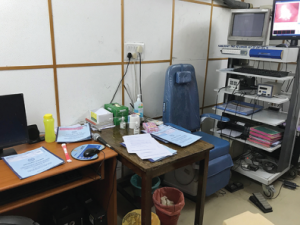Space, time, and resources are so limited that, for example, a single room is reserved for flexible laryngoscopies and postoperative sinus debridements to facilitate the clinic flow and accommodate a high volume of patients. I learned valuable lessons in resource utilization and improvisation while shadowing attendings at CMC who are adept at providing effective healthcare services despite numerous constraints.
Explore This Issue
May 2018Hearing loss is a global problem affecting millions of people around the world. Often, the otolaryngologists at CMC travel hours to remote village clinics multiple times a week to provide basic otolaryngology care to local villagers who otherwise would have no access to healthcare. Audiology services in these clinics are scarce, even though hearing loss and chronic ear disease are quite prevalent. To improve access to hearing healthcare, a portable tablet audiometer for use outside a sound-treated booth was developed by SHOEBOX Audiometry (a division of Clearwater Clinical, based in Ottawa, Ontario, Canada).
Rural India lacks necessary healthcare resources, and most physicians in India are concentrated in the bigger cities, leading to significant disparities in many regions. I was able to take this innovative piece of mobile technology and work with the CMC department to implement the first steps in improving accessibility to hearing healthcare in rural India.
Otolaryngologists as Global Health Humanitarians

Dr. Yalamanchali’s clinic room for conducting audiograms using portable audiometry.
© Dr. Yalamanchali
As a current resident in training, my global health experience was a reminder of the true humanitarian focus of our field and our capacity to create change. By gaining exposure to a healthcare system very different from that in the U.S., we have started a critical dialogue to improve healthcare delivery, both abroad and locally.
As the world and its economies become increasingly globalized, it is necessary to think about healthcare in a global context. In many parts of the world, limited resources lead to unequal distribution of healthcare. Otolaryngology is a technologically advanced field, and the things we take for granted in the U.S. are often luxuries in resource-limited regions. In the U.S., we routinely use otoscopes, microscopes, endoscopes, and advanced surgical instruments that are rare in most parts of the world.
Otolaryngologists have long been involved in global humanitarian surgical and clinical care efforts. Quite often, global health initiatives consist of short-term medical service trips. These much-needed short-term reliefs often fall short of identifying and solving long-term problems. To better define and cultivate the field of academic global health, there has been a call to include formal coursework and a push to foster sustainable collaborations with teaching hospitals overseas (Surgery. 2013;153:316–320). There has even been a significant increase in the volume of global health-related publications in otolaryngology journals with growing awareness and interest in global health as an academic pursuit (Laryngoscope. 2015;125:848–851).